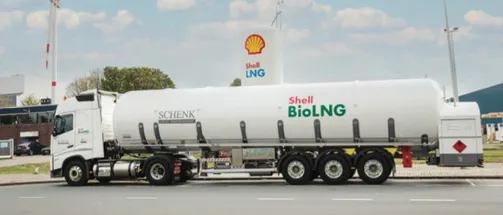Road transport companies want to drastically reduce their emissions. With passenger cars, the focus is almost entirely on electrification. However, the path is not that straightforward for these commercial businesses. Various fuels have emerged, each with specific CO2 savings and associated infrastructure.
Fit-for-55
In the European Union's ‘Fit-for-55’ policy, LNG and BioLNG are alternate fuels that contribute significantly to Commercial Road Transport's lofty goals. This report says EU member states must provide sufficient network coverage to the Trans-European Transport Network (TENT-T) for bio-LNG. Shell supplies BioLNG in the Netherlands.
That comes from the plant it opened with partners Nordsol and Renewi in Amsterdam in the fall of 2021. By mid-2023, Shell expects to supply 100% BioLNG to the entire Shell network in both Germany and the Netherlands. That is partly thanks to the start, in early February, of construction of Europe's largest BioLNG production facility in Godorf, Germany.
According to Shell, it requires vision, cooperation, and often plenty of courage to make road transport more sustainable by, say, discontinuing the use of traditional diesel. Günther Maters, the CEO of the Dutch company, Koeltrans, is a pioneer in this field.

Why Shell BioLNG for Koeltrans?
"Firstly, because as a progressive company, we must continue innovating. Also, alternative fuels are required in every major tender. We switched to LNG for various reasons. It's a game-changer that's well-suited to our German routes. LNG trucks are exempt from tolls. That saves us €0.17/km," begins Günter.
"We're delighted with our LNG trucks' long range, reliability, and low operating costs. I'm ambitious about our company footprint, and Shell BioLNG is the right fuel to start this journey to net-zero. Our customers can now save 30% CO2 with Shell BioLNG, compared to diesel."
Why invest in BioLNG?
"This product suits our type of transport extremely well. Shell is the first to offer a BioLNG blend on its entire Dutch network. We're looking forward to switching to a 100% Shell BioLNG next year. We're confident in LNG and that it will remain competitive with alternatives for the next decade. As with all fuels currently, price is obviously a challenge," continues Günter.
"So, you have to make good agreements with your clients. Shell is a true partner. This relationship has strengthened us, and, with the right partner, we're able to expand our fleet by 30 LNG trucks. We'll soon have a 50% diesel/50% BioLNG truck fleet. We're confident about the future and the long-term story. We must contribute to the energy transition together."

Why chose Shell as a long-term energy transition partner?
"We switched to Shell in 2020 because of several value additions. We could collaborate with a comprehensive network and road services provider. That's combined with integrated management data and analytics options. Then there's Shell's reputation and reliability as a global player with the right facilities. Shell is also a major LNG player. Plus, it was thanks to our account manager's proactive planning and the Shell organization's quick action," Günter concludes.
Source: Shell
For more information:
Gunther Maters
Koeltrans Angeren
Tel: +31 (0) 263 252 407
Email: gunther@koeltrans.nl
Website: www.koeltrans.nl
